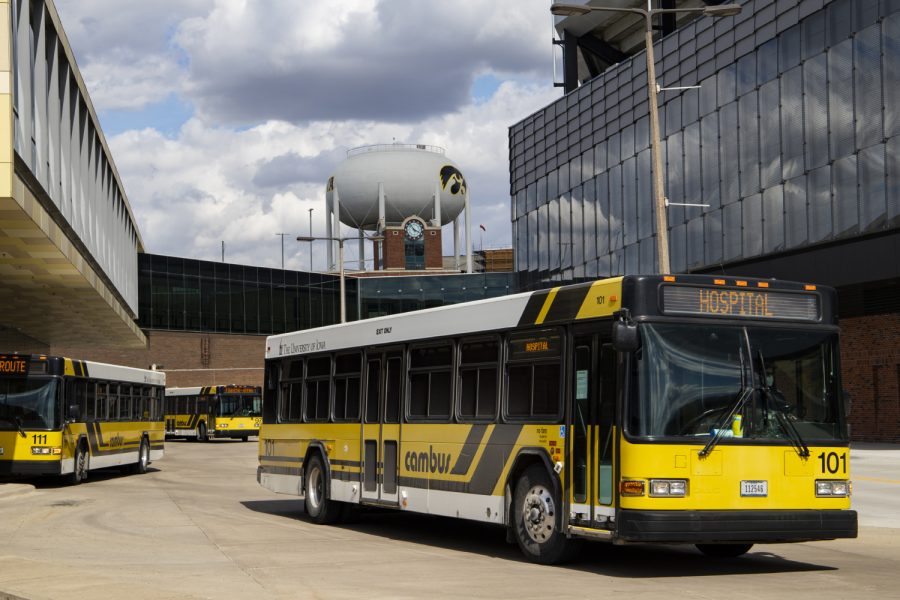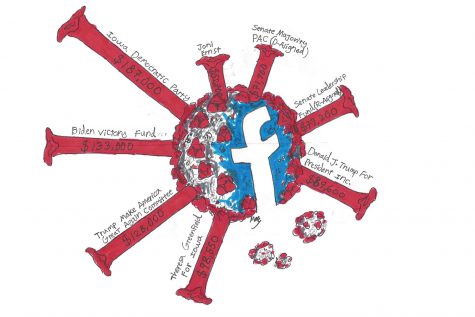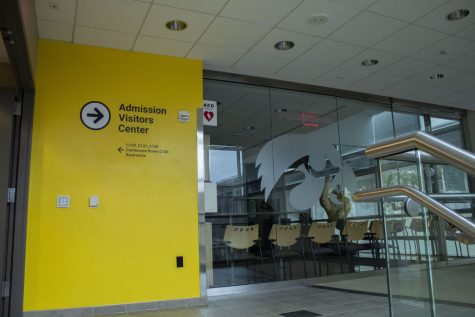Cambus updates sanitation procedures, implements UV lights and daily disinfecting
The university’s transportation service now sprays down buses with disinfectants daily, uses UV lights to kill bacteria, and installed plexiglass shields.
Cambuses pick up and drop off passengers at the WCTC stop on Monday, April 20, 2020.
September 27, 2020
Cambus transit systems recently updated their daily sanitation procedures in light of health and safety concerns brought on by COVID-19, as a primary service of public transportation service in Iowa City and on the University of Iowa campus.
Cambus has implemented plexiglass shields around the transit operator, to allow for front-door boarding to resume.
A team of employees spray down each and every bus – especially the “high-touch” zones, such as handlebars and seats – with a liquid disinfectant when the buses cease operating for the night.
More recently, Cambus has used UV light technology to help kill bacteria and germs that may be located within those same high-touch zones.
Cambus Operations Manager Mia Brunelli said the Cambus team has followed guidelines from the Centers for Disease Control and Prevention, the UI, and public health officials — constantly evolving its disinfecting procedures since COVID-19 became a prominent, local issue in March.
“Ever since March when the pandemic was breaking out here in the U.S., it became apparent that we really needed to look at our cleaning and disinfecting processes and to make sure we were really doing everything we can to protect both our employees and the riders who use our vehicles to get around campus,” Brunelli said.
Cambus Manager Brian McClatchey said Cambus was able to purchase the UV lights using additional funding in their budget.
RELATED: Cambus to temporarily close stops, with updated routes and mitigation efforts
Brunelli said the purchase of the UV lights has paid off. The process has been extremely efficient, she said, which has lowered the increased workload of their employees.
She added that it appears the cost to buy the lights is close to breaking even.
In addition to implementing new sanitation procedures, McClatchey said, Cambus has also greatly expanded its bus services to commuter parking lots – especially those used by employees at UI Hospitals and Clinics – and increasing the amount of buses in transit has helped them better disperse passengers.
Brunelli added that many Cambus operators report that passengers are compliant with wearing appropriate face coverings, which she credits toward the UI’s efforts of encouraging all community members to wear face coverings in public areas and gathering spaces.
UI senior and Cambus Student Mechanic Jason Rathjen said he participates in the updated sanitation processes and is responsible as a mechanic for setting up the UV lights to disinfect the buses each day.
Rathjen said he supports the newly implemented sanitation practices, and believes they are extremely efficient in providing the safest environment for Cambus passengers and operators.
“I think it’s a really good idea,” Rathjen said. “I think it’s the least we can do at Cambus to help contain the spread of COVID-19, given that we’re a public-transportation service, there’s a lot of different people from a lot of different areas using our service, so whatever we can do to make sure that our buses are clean and safe to ride for the public, they’re all great ideas.”
RELATED: Transportation committee advocates for longer bus hours, universal bus passes
Rathjen added that Cambus is open to feedback and suggestions as to how it can further improve its transportation system, especially in consideration of health and safety.
“If anybody has any suggestions, or they see anything that maybe they think could be improved, don’t hesitate to reach out,” Rathjen said. “Call Cambus and let us know — we’re open to suggestion ideas to make sure that the public feels safe.”
Brunelli said Cambus plans to continue to maintain and use the UV light system after COVID-19 runs its course, because she thinks this equipment will be helpful during flu season in present and future years.
UI junior and Cambus Transit Operator Michaela Messier participates in the updated sanitation processes, and said she sprays down each bus with disinfectant spray four nights a week.
Messier said Cambus, as an essential public transportation service, is responsible for ensuring community safety.
“I feel like the whole bus and transit system is a pretty easy way to spread the virus, so I definitely think that it’s important to slow the spread, and just help our community, and it’s just a way to do our part,” Messier said. “I think the way that we’ve got [the sanitation procedures] set up is pretty efficient.”
Messier said the updated sanitation processes help provide not only Cambus passengers peace of mind, but employees as well.
“Just knowing that so many people are on them every day, and so am I, but knowing that I sanitize them the night before and I’m doing again — it’s more of a calming feeling because I know that it’s been wiped down,” Messier said.




















